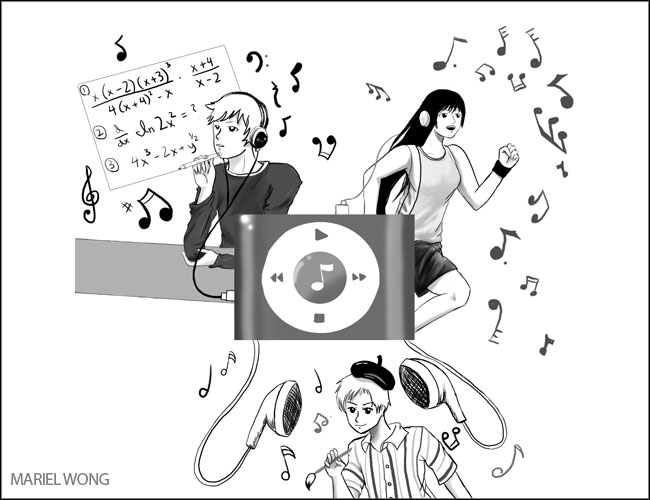
There are few things in existence that can evoke the emotions of the heart and soul to as great a degree as music can. At its most basic level, it appears to be nothing more than sounds and notes. But in reality, music is a subject that is both deep and personal.
As sophomore Patrick Lin puts it, “Music is life.”
Acknowledging the utility of music, Senior Sammy Shufton says, “I’m aware of the fact that music triggers certain emotions… and too big a clash between emotion and what I’m listening to rarely helps.”
People’s preference of music changes tremendously depending on their emotions.
Lin says, “When I’m sad or lonely, I’d be listening to slow Drake songs [because of] the melodies and the smooth feel of the songs.”
AP Psychology teacher Carlo Corti says, “Any time I’m getting a little more sad…I think [of] music that has a faster beat, more pleasant lyrics… An example I could think of specifically is the group Mumford and Sons. I can’t listen to them and be upset.”
Often times, lyrics and other musical decorations strengthen a song’s emotional connection to its listeners.
“Lyrics are specific to every song,” says Corti. “Sometimes you don’t notice lyrics at all – they mean nothing at all whatsoever to you. But there are times where a musician, like a poet or writer, just captures so succinctly exactly the way you feel whether it’s happiness or sadness… and if the lyrics mean something… the music becomes more powerful.”
Because of music’s ability to complement human emotion, it is often used in various activities.
Sophomore Alex Garcialuna, a cross country and track runner says, “When I run, I kind of think of a song and pace myself to the beat of that song.”
Sophomore Nathan Perisic says, “Before water polo games, I listen to motivating songs to get me focused.” He cites “Lose yourself” by Eminem as an example and says, “The lyrics and the beat put me in the moment.”
Many students also find music to be an appropriate addition to study time. Junior Miles Lang says, “For history, I listen to classical music, and for all other subjects I listen to light rock. History, I find, is a tad harder to concentrate on and classical music helps to kind of get me focused.”
Freshman Wesley Lee says, “I like JRAquino’s music because sometimes I want something that is peaceful and not so upbeat… it keeps me calm when doing homework…[On the other hand] ‘Party Rock Anthem by LMFAO… is very catchy… and it’s just a stress reliever when [I’m] doing piles of homework.”
Sometimes, music is an avenue for expressing religious beliefs.
Lang says, “I use my acoustic guitar… to play songs for Christian club. We focus on singing worship and praising God, so [music] adds a different level of praise. There’s quite a few Christian songs that stand out to me in particular. ‘Our God’ by Chris Tomlin, ‘Indescribable’ by Chris Tomlin – they really reflect how God is and how great he is.”
Junior Candy Tong, a dancer who has danced with the San Francisco Ballet, relates music with dance. “Music kind of takes you to a whole other world because without it, you’re kind of stressed and only focusing on the steps,” she says. “You feel like you’re actually dancing when the music is there to help you.”
When Tong dances, her style changes with the type of music. “If it’s staccato, then you are sharp and crisp. If the music is waltzy, you dance flowy and soft. And if the music is legato, we would do adagio [and] dance smoothly,” she says.
Music is a unique addition to life, and though the way it is used may vary depending on the person, there is no doubt that it has the ability to affect the mindset of the individual.
Explaining the psychology behind this idea, music teacher Troy Davis says, “[Individuals] feel a strong connection to music because it’s a way for them to express themselves creatively in ways they are not able to in words.”
While human beings may never fully grasp music to its entirety, it is ubiquitously understood that it is something different and special to everyone. To Shufton, “Life and music…they’re one and the same.”




